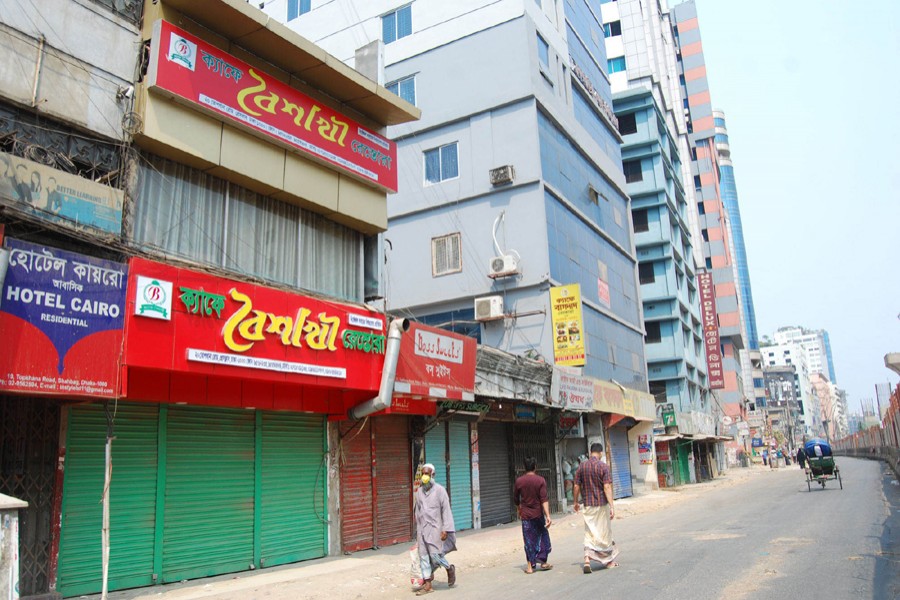"My restaurant has remained shut for 10 days now due to coronavirus. I've lost my daily earnings. All my 11 cooks and hotel boys are waiting for their wages."
"Who will give me support now?"
This is how Hasan Sarker, a small restaurateur in Keshorehat of Rajshahi laments his fate.
"I have to repay an NGO Tk 15,000 installment per month. I've a five-member family to feed. The March salary is yet to be paid to my workers," he said.
"I need to pay Tk 25,000 house rent and Tk 3,000 electric bill this month. But I don't have a single penny in my pocket…" Mr Sarker told the FE.
"I've no paper for my trade. I never took out any loan from any commercial bank in my 16-year business. Can I get any bank loan at a subsidised rate?"
Dozens of small traders in rural and urban areas have echoed Mr Sarker's views on the matter as the FE talked to them about the Tk 727.50-billion government package.
Prime Minister Sheikh Hasina on April 05 announced a Tk 727.50-billion fiscal package to facilitate large, SMEs and micro-businesses and enterprises.
"I've no documents to prove my business. The thing is the funds will largely be grabbed by big business," said motorbike repairer Jahed in Dhaka's Mirpur area.
"My shop has remained closed since March 27. I've no income to pay March salary to my three mechanics. I have also failed to pay rent and other bills."
"If this situation prolongs," Mr Jahed said, "I will have no option but to leave my business."
Small entrepreneur Faridul Huq from Rampal, Bagerhat, said: "I've a poultry firm with 5,000 chickens. I'm facing loss for a drastic fall in market prices. My income has hit rockbottom."
On the bailout package, he said: "I may not get banking support for no papers to prove my business. Banks are ready to support big enterprises only."
Bangladesh is the home of an estimated 8.07 million micro- and medium-sized business units, according to the Bangladesh Bureau of Statistics.
More than 91 per cent of the total employment is created by the informal sector in the country, shows the Bangladesh Labour Force Survey 2016-17.
Agriculture is the largest generator of jobs, employing 40.6 per cent of the total working population followed by service sector 39 per cent and industrial sector 20.4 per cent. Informal businesses and enterprises are mostly lying in the agriculture and service sectors here.
Wholesale and retail businesses like repair of motorised vehicles comprise 45.91 per cent followed by transportation and storage 13.65 per cent and manufacturing 11.76 per cent.
Other trades like accommodation (hotel/restaurant) and food services contributes 4.77 per cent, education 3.93 per cent, construction sector 2.39 per cent, and forestry and fishing 2.90 per cent.
Bangladesh Hotel Restaurant Sweetmeat Workers' Federation in a statement on Monday feared they might be left out of the recovery package as they are the missing groups in economy.
Some 1.9 million jobless workers in this sector are demanding a special package for tackling corona's impact on their earnings, said Anwar Hossain, general secretary of the federation.
Bangladesh Agricultural Movement Association in a statement on April 05 said the government-declared package would not benefit the informal-sector farmers and small entrepreneurs.
Meanwhile, some leading local economists have also apprehended little benefits to the enterprises and businesses in the informal sector.
They said often bypassed by banks, the informal sector is unlikely to get much benefit from the stimulus package.
They suggested the government allocate cash support for informal economic establishments and entrepreneurs who generate substantial jobs.
They also called for engaging micro-finance institutes to lend money from the support package to the informal establishments.


